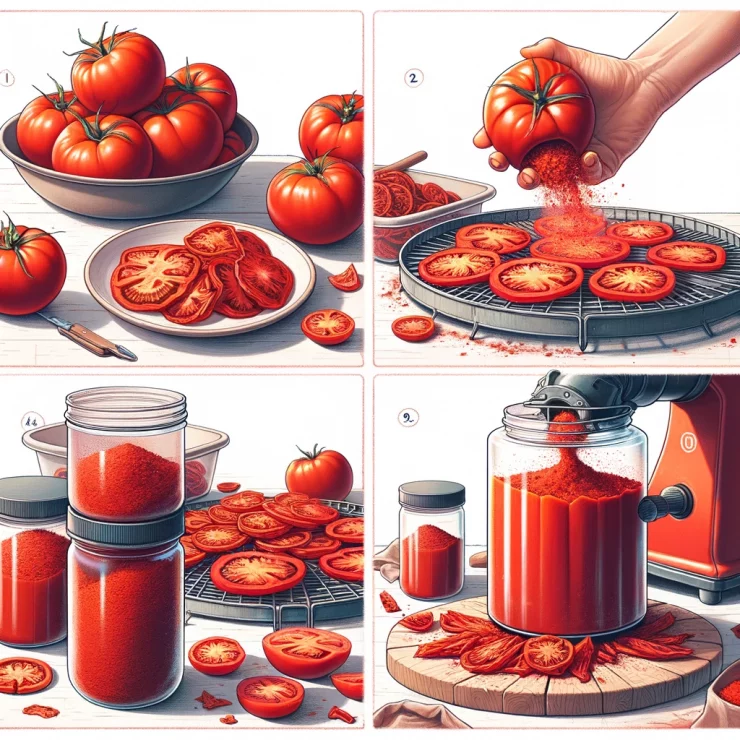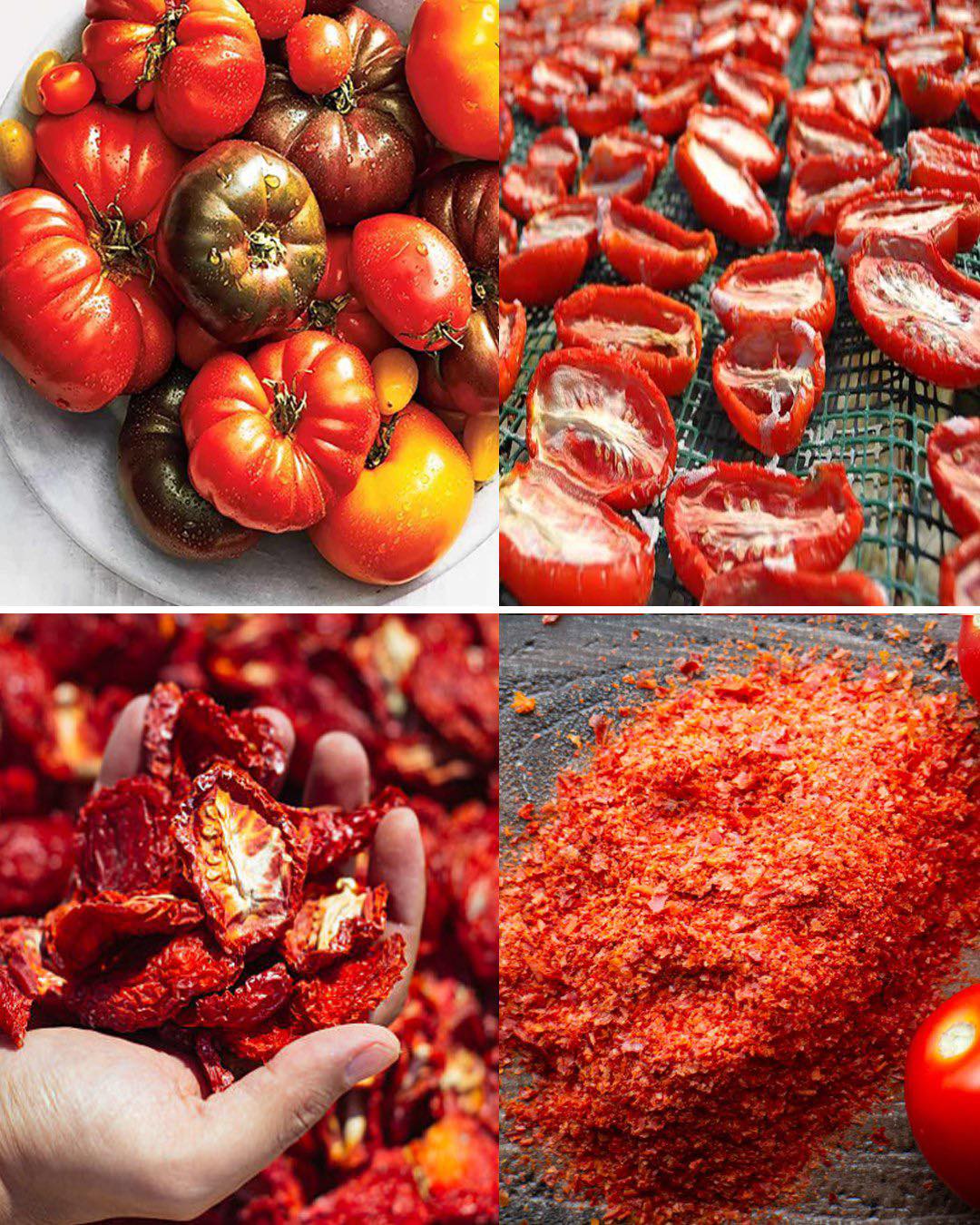Tomatoes are a staple in many kitchens, adding vibrant color and delicious flavor to countless dishes. But what happens when you find yourself with an abundance of ripe tomatoes that you simply can’t use up fast enough? Instead of letting them go to waste, why not turn them into a versatile ingredient that you can enjoy year-round? Enter tomato powder – a flavorful and convenient way to preserve the essence of fresh tomatoes for use in soups, sauces, seasonings, and more. In this article, we’ll explore how to make tomato powder at home and discover some creative ways to incorporate it into your cooking.

Why Tomato Powder?
Tomato powder is essentially dehydrated tomatoes ground into a fine, concentrated powder. It’s incredibly versatile and has a wide range of culinary applications. Here are a few reasons why you should consider making tomato powder:
Extended Shelf Life: By removing the moisture from tomatoes and turning them into powder, you can significantly extend their shelf life. Properly stored in an airtight container, tomato powder can last for up to a year or more.
Intense Flavor: Tomato powder packs a concentrated punch of tomato flavor, making it a fantastic addition to sauces, soups, stews, and marinades. Just a small amount can enhance the taste of your dishes significantly.
Convenience: Unlike fresh tomatoes, which can spoil quickly, tomato powder is shelf-stable and easy to store. It’s also lightweight and takes up minimal space in your pantry, making it a convenient ingredient to have on hand.
How to Make Tomato Powder
Making tomato powder at home is surprisingly simple and requires just a few basic steps:
Select Ripe Tomatoes: Choose ripe, flavorful tomatoes for the best results. Roma tomatoes are often preferred due to their lower moisture content and intense flavor, but you can use any variety you like.
Prepare the Tomatoes: Wash the tomatoes thoroughly and remove any stems or blemishes. If desired, you can peel the tomatoes by blanching them in boiling water for a few seconds and then plunging them into ice water to loosen the skins.
Dehydrate the Tomatoes: Slice the tomatoes into thin, even slices and arrange them in a single layer on a dehydrator tray or baking sheet lined with parchment paper. If using a dehydrator, follow the manufacturer’s instructions for drying fruits or vegetables. Alternatively, you can dry the tomatoes in a low oven (around 200°F or 95°C) for several hours until they are completely dry and brittle.
Grind into Powder: Once the tomatoes are fully dehydrated, allow them to cool completely before transferring them to a blender or spice grinder. Pulse the dried tomatoes until they form a fine powder. You may need to do this in batches, depending on the size of your blender or grinder.
Store Properly: Transfer the tomato powder to an airtight container, such as a glass jar or resealable plastic bag. Store it in a cool, dry place away from direct sunlight.
Creative Ways to Use Tomato Powder
Now that you have a batch of homemade tomato powder, it’s time to put it to good use! Here are some creative ways to incorporate tomato powder into your cooking:
Homemade Pasta Sauce: Add a spoonful of tomato powder to your favorite pasta sauce recipe to boost the tomato flavor and richness.
Flavorful Seasoning Blend: Combine tomato powder with herbs, spices, and salt to create a versatile seasoning blend for sprinkling on popcorn, roasted vegetables, or grilled meats.

Tomato Soup: Use tomato powder to thicken and flavor homemade tomato soup. Simply whisk it into the broth until smooth, adjusting the amount to achieve the desired consistency and taste.
Pizza Dough: Add a tablespoon of tomato powder to your pizza dough recipe for a hint of tomato flavor and a vibrant red color.
Marinades and Rubs: Mix tomato powder with olive oil, garlic, and herbs to create a flavorful marinade for chicken, fish, or tofu. You can also use it as a dry rub for meat before grilling or roasting.
Tomato Dip: Combine tomato powder with Greek yogurt or sour cream, along with your favorite herbs and spices, to create a tangy tomato dip for chips, crackers, or fresh vegetables.
With its intense flavor and long shelf life, tomato powder is a valuable addition to any kitchen pantry. Don’t let your surplus tomatoes go to waste – turn them into delicious tomato powder and elevate your cooking to new heights!
News
JJ Redick reacts to Luka Doncic trade for Anthony Davis
In one of the most jaw-dropping moves of the season, the NBA landscape was rocked by the blockbuster trade involving Luka Dončić and Anthony Davis—a swap that has sent ripples of excitement, disbelief, and heated discussion through the league. Among…
Anthony Davis FULL reaction to trade to Mavericks for Luka Doncic
In a blockbuster move that sent shockwaves through the NBA and left fans reeling, Anthony Davis has been traded to the Dallas Mavericks in exchange for Luka Dončić. In the immediate aftermath of the news, Davis took to the media…
Shaq reacts to Dallas Mavericks wanting Kevin Durant after Luka-AD trade 👀
In the constantly shifting world of the NBA, trade rumors and blockbuster moves are a regular part of the season’s drama. The latest twist has fans buzzing: the Dallas Mavericks have reportedly set their sights on acquiring Kevin Durant in…
Donovan Mitchell FILTHY poster dunk on Kristaps Porzingis 😳
In a game filled with high-intensity moments and jaw-dropping highlights, one play in particular has left fans and analysts buzzing about Donovan Mitchell’s latest display of athleticism. Early in the contest, with the atmosphere already charged by an evenly matched…
Joel Embiid hits go-ahead bucket vs Mavs then chats with Anthony Davis after game
In one of the most thrilling contests of the season, Joel Embiid delivered a clutch performance against the Dallas Mavericks, punctuating the game with a go-ahead bucket that sent the home crowd into a frenzy. The atmosphere in the arena…
D’Angelo Russell game winner as Nets hit two 3’s in 3 seconds to win vs Rockets 😱
In one of the most electrifying moments in recent NBA history, D’Angelo Russell delivered an unforgettable game-winner that left fans and commentators in complete awe. With the Brooklyn Nets locked in a tense battle against the Houston Rockets, the outcome…
End of content
No more pages to load











